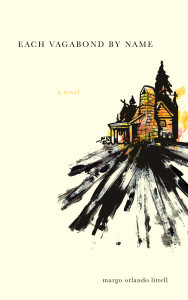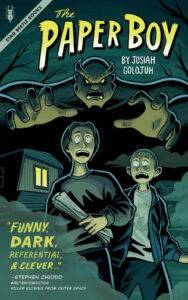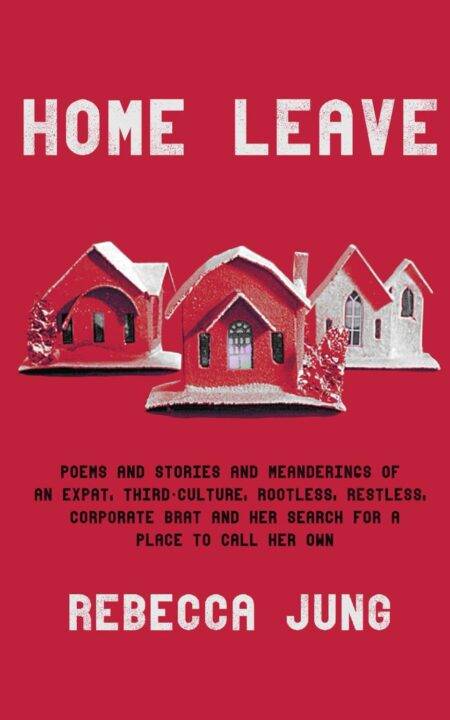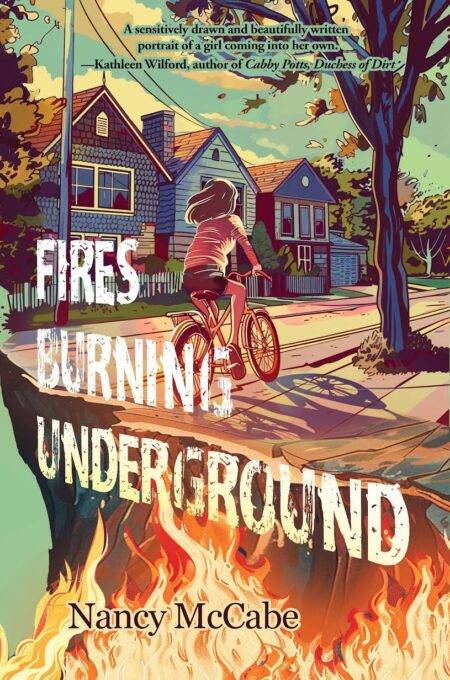Littsburgh is thrilled to be able to share the below excerpt from Each Vagabond by Name by Margo Orlando Littell. Littell will be visiting her hometown of Connellsville on June 18th (for an event at Carnegie Free Library – Connellsville)… we’re hoping she makes it into the city proper as well!
When a band of itinerant thieves arrive in a remote coal-mining town in Pennsylvania, Zaccariah Ramsy, owner of the local bar, finds himself drawn into their world. Meanwhile, Stella Vale, Ramsy’s former love, believes that her long-lost daughter might be among those who begin to rob townspeople’s homes. As tensions between Shelk residents and the newcomers rise, Stella and Ramsy must decide whether they will remain isolated from the world around them―or reach for a life of new possibilities.
A piercing tale of isolation, redemption, and belonging, Each Vagabond By Name is a powerful exploration of loss by a commanding new literary voice.
CHAPTER 1
They rang the doorbell once. They’d been watching the house—two stories, red brick—and knew someone was home. They’d seen her drive up and carry in two sacks of groceries half an hour before.She opened the door, neat tan slacks and a pilled red cardigan over a white turtleneck. “Can I help you?”
They bowed their heads. “A glass of water, ma’am, if it’s not too much trouble,” one said. No explanation, no apology, no reason why they should be refused.
The woman glanced over their shoulders then said, “Wait here.”
She left the door open when she went to the kitchen, the storm door unlocked. Quickly one of them slipped inside. He found the staircase and ran up as a cupboard banged shut. The bedroom he came to had not so much as a shoe on the floor. This one was easy. Top dresser drawer, behind the cupped white bras and rolled brown stockings, just as he’d thought. In a house like this, furniture matching, carpet old but carefully kept, things were always where they belonged. He took out the jewelry box and emptied its contents into a small cloth sack.
As he crept downstairs, he heard the woman open the porch door. “What happened to your friend?” she asked, her voice now suspicious. He ran to the kitchen and out the back door before he heard the other’s answer.
Back in the mountains, they spread what they’d taken on the floor of their tent. A tangle of necklaces, a gold watch that had stopped, a few tarnished rings, a crystal brooch in the shape of a leaf. Two pairs of gold hoop earrings in small velvet pouches—fourteen carat at least, eighteen at the most. As soon as they’d seen the house and the woman, they knew what they’d find. They’d seen a lot of towns in their wanderings, and they’d learned early on that people and the things they loved were all the same.
It was an ordinary fall until the gypsies came. Leaves changed, fell, and clogged the curbside gutters. Crackling footsteps approached and receded, and the blue sky took Ramsy’s breath when he glimpsed it through his bar’s small window. For the first time in years, it made him feel hopeful, even though he knew better. There wasn’t any more reason to feel hopeful in the fall than at any other time, and anyone who believed otherwise was setting himself up for a life of disappointment. The blue of the sky and the smoky burning leaves in the air didn’t hold any magic, and they would disappear just like the hot yellow days of summer. Still, Ramsy felt something different this year, some stirring in his blood. Each morning, when he gazed at the maples like red smoke on the hills, he found himself unable to look away, as though something he’d been waiting for would fly out, any moment, from the branches.
Zaccariah Ramsy was a tall man, with long white hair and skin the color of whiskey. He had only one eye, bright blue and peering from a web of veins. The other socket was empty, sewn over with bits of skin, as red and raw as though the eye had been removed that day. It hadn’t—he’d lost it in Vietnam—but it looked that way. The patch he used to wear made people too curious. Eventually he left it off. Few people wanted to look at Ramsy now, which gave him plenty of time to study them.
Ramsy’s bar was at the end of a tree-shrouded road that curved into the mountains like S’s end-to-end. The bar was a cabin really, built with logs and boards, and nothing about it suggested what lay inside. There were no beer signs in the window, no welcome mat by the door, no airbrushed sign calling out to drivers by the turn. The bar didn’t make much of a profit, but it was somewhere to go, something to do in a small town like Shelk, and Ramsy was proud of it. The room was narrow, like a trailer. There were eight stools around the bar, and the walls inside were paneled with thin, dark wood. The only real light came from a wobbly lamp near the cash register and the portable, rabbit-eared TV. Only the people who knew about Ramsy’s bothered driving out that way. Outsiders took the toll road, which wound around Shelk and other mountain towns and led, eventually, to the Turnpike.
Shelk had a small downtown of blackened storefronts and weedy vacant lots, a grocery store, a Dollar General, and some local businesses that had been around for years: a printer, a trophy and baseball card shop, and a music store where high school students rented band instruments. Shelk wasn’t poorer than any other town. There was a decent public school, and the residential streets were clean. People didn’t walk in the old Southside Park at night, and no one would want to go into the mountains after sunset, but most felt safe. They locked their doors when they left the house, but they didn’t drive out of their way back home if they forgot.
In the three years past, Ramsy had seen nearby towns get wiped off the map. The bituminous coal that had fed the area for decades was harder to find now, but willing men could get in with one of the new companies shearing off the mountaintops to get to the coal inside. The blasts from the hilltops heaved silica dust and small pieces of rock over the towns like snow that wouldn’t melt, forcing people who’d never gone more than twenty miles from home to pack up and move on. Whole families—three, even four generations—took the payout money and resettled, even though the idea of bulldozed homes wasn’t easy to swallow. But Shelk was safe, nestled in coal-poor mountains that held nothing but white pines, eastern hemlocks, and American beeches.
Shelk was the kind of town where people were rarely disappointed. Pittsburgh and Morgantown were just over an hour’s drive, but most folks were put off by the heavy traffic and stayed at home. Sometimes people camped for a weekend in the mountains, or drove through the counties in southwestern Pennsylvania just to say they’d been there. It was enough. Teenagers called it boring, but they, too, stayed on. No one forced them. The road was right there, crooked and potholed, but open.
Ramsy first heard of the gypsies in early October. He’d spent the day as he always did. He got up when he woke up. He counted the money from the night before and recorded the number in a small blue notebook. Then he headed into town, to the drive-through window of Pittsburgh Federal, and put the cash into a plastic capsule that whooshed through a tube to the teller inside.
Running a small bar wasn’t a job that required too much thinking, but there were things he had to do. Since it was a Monday afternoon, he drove to the beer distributor and backed into a parking spot in front of the open warehouse door. Inside, coolers of six-packs and cold cases lined the walls. He filled the truck bed with five cases of Budweiser, five of Coors Light, three of Yuengling, and two each of Iron City and Pabst Blue Ribbon. It had been a long time since he’d bothered keeping anything else on hand, save a bottle of whiskey or two. Light, bitter, cheap—these were what the men he served wanted.
Later, with his truck full of beer, he went to the bar. It was getting dark already—even in October you could smell winter in the air, clear as smoke from cigarettes—and he unloaded the cases in the last of the twilight. He filled the cooler with ice from the icemaker out back and broke down the cardboard cases as he emptied them. He put a few bills into the register for change. Then he turned the ballgame on, the volume low.
That night, Ash Haggerty and Charlie Snyder came in for drinks after working the mines, and they spoke of their wives while shadows slipped through the window.
“Junie was in one of her moods again,” Charlie said. One or the other of them always started off this way—with a mood, with an irritated glance, with a remark said sharply for no reason at all. “Told her my chicken was a little dry, and she dumped the whole plate in the sink. Five bucks of chicken, wasted.”
“Least she cooked,” Ash said. “Meg flat-out refused last night. Said she’s too tired. I had to go down to McDonald’s and get us a sack of burgers. Then she complained she was gonna get fat. Jesus.”
“It’s the job,” Charlie said. “Wears her out.”
“Yeah. The job.”
Ramsy had met Charlie and Ash’s wives. Junie was a bus driver for the school kids, her voice harsh and quick to yell, her nails stained with the bus’s black grease. Meg worked the breakfast shift at the Rowdy Buck, Shelk’s diner, and knew most people in town. All of them had married young and settled close to where they’d been born, just a few streets away from the houses and rooms that had held them as infants.
Charlie and Ash were gentler about their wives, more likely to show their hurt and confusion, without Jack Kurtz there. No one could complain about their home life the way Jack Kurtz could. As far as Jack was concerned, his wife, Kitty, wasn’t good for much more than spending his money without showing the proper appreciation. He complained that her need for attention could suck the air out of a room, and that her manufactured rage when people talked behind her back was equal only to her determination to keep them talking. Charlie and Ash were quick to complain but just as quick to defend, a habit Jack Kurtz ridiculed.
After their second round, Charlie asked Ramsy, “You hear the news?”
Ramsy didn’t listen to the news. “News of what?”
Charlie leaned forward. “There’s strangers in town,” he said. “Gypsies.”
“Gypsies?”
“We’re not the first town they hit. Came over to us from Owl Creek.”
“Gypsies? In P-A?”
“That’s what they say,” Charlie said. “They’re breaking into houses. Sneaking in. They’re saying you gotta lock your doors now all the time, or they’ll get inside. Heard they stole fifty grand in Owl Creek,” he said. “People’s life savings, for Chrissake.”
Five houses had been robbed so far, every one of them during the day, and in three cases the owners had let in the gypsies themselves. “Gal named Mary Kolecik opened her own door for two of them,” Charlie said. “Took her cash and jewelry when she went to the kitchen to get them some water.”
Food went missing, too. Fruit bowls were emptied of oranges and apples. Milk, juice, and beer disappeared from refrigerator doors. Cheese, bread, peanut butter, crackers—the empty spaces on shelves sometimes went unnoticed until hours or even days after the crime, opening the wounds all over again. These weren’t things that made the paper, but the missing food was what people talked about most among themselves. A few leftovers, a few canned goods—they weren’t worth anything in the end, but, once they were gone, they were what people remembered. There, near the coffee, was where the Campbell’s soups had been. Two pounds of ground chuck had been sitting on top of the eggs. Boxes of cereal, tins of homemade cookies, Tupperware containers of two-day-old chicken and rice—everyone who’d been robbed had a detail to add. They even took the cake left over from Jenny’s birthday, they said, and it was this as much as anything that made people shake their heads and double-check their locks at night.
There seemed to be an understanding that the gypsies would soon move on, that the danger was mild and temporary, something to be put up with for a short, inconvenient while. A rolling feeling in Ramsy’s gut told him otherwise—but he kept quiet and let the men in his bar believe what they liked. Outsiders always caused a stir in Shelk, and Ramsy wasn’t in the habit of worrying about himself or others—he found it tiresome and with few rewards.
He made an exception for Stella Vale. Stella lived alone and wasn’t the sort to open her door for strangers, but Ramsy still worried she’d let them in, offer tea or juice, linger in the kitchen while other gypsies took their time in her drawers and closets. Stella didn’t have much that a gypsy might want, but it didn’t matter. Ramsy didn’t like the thought of anyone in her house at all.
So he was relieved when she came into the bar the next night and sat down in her usual spot, farthest from the door. Ramsy rose from the wooden stool he kept behind the bar, lifted a bottle of red wine from a glass-doored cupboard, and poured a good bit into a tumbler. Nobody else drank wine in his bar, but he kept it on hand for Stella. They didn’t talk until everyone had left. Ramsy poured himself a drink, then leaned up against the bar near Stella.
“Two people came into the library,” Stella told him. “It was a busy day.”
“They take out any books?”
“They used the copy machine and left.”
Ramsy hadn’t been to the library for a decade, but he imagined Stella sitting behind the horseshoe-shaped desk with a newspaper or a water-stained book, waiting out the hours while the grandfather clock in the entryway tick-tocked its bulbous pendulum. It was how she spent her time in the bar, too, waiting out the hours with drink after drink.
Stella’s hair was silver-streaked and long, her frame thin but womanly, her kitten-gray eyes unlined. In another town, where nobody knew her, she might have been mistaken for a younger woman. But in Shelk there was no erasing the years she’d endured.
Ramsy drank and felt the whiskey slowly seeping into his blood, his gums, the tissues of his throat. It felt warm and familiar. The wine relaxed Stella, too—he could see the tension leaving the sides of her jaw, her temples, and her neck. He poured her a few more glasses—three? four? He’d lost track. She was probably drunk by now, but Ramsy could never tell. The only sign was a slight downward slope of her eyelids when she smiled.
“I’d better get going,” Stella said once the night tilted toward morning.
“It’s cold,” Ramsy said. “I’ll drive you home.” He wiped down the counter, drained the melted ice, straightened the stools around the bar, and emptied the cash register into a zippered rubber pouch. He turned off the lights, and Stella followed him outside to his truck. The mountain night was perfectly still.
Stella always walked to the bar, and Ramsy often drove her home when it was cold outside. He turned the heater on high and kept a steady speed around the sharpest curves, expertly balancing gas and brake, lightly steering with his fingertips. He knew Stella liked to watch him drive, and sometimes, if she was tired or had had too much to drink, she sat in the middle seat and rode with her head on his shoulder.
“Have you heard about the gypsies?”
“I’ve heard.” She was looking out the window, and her breath fogged the glass.
“I want you to be careful,” Ramsy said. “Lock your door when you take a bath. Lock it when you leave. You don’t want them to get inside and take anything.”
“Take anything?” Stella said. “Everything I have’s been taken already.”
Ramsy felt cold spread from his stomach through his veins. She meant, of course, her baby. Her Lucy.
“Thanks for the ride,” she said when they reached her house, and she didn’t look back as she walked down the path. Once she disappeared inside, Ramsy drove away, cursing himself.
It was dark on the road. Early snow clouds covered the stars and moon, and Ramsy’s headlights barely broke the cold, bitter blackness. When he left Walnut Drive and started down Linden Street, he saw red and blue flashing lights on the shoulder a few blocks down, by the turnoff to the road that led to the mountains. He slowed his truck. A state police cruiser crookedly nosed the curb, its back end sticking out into the road. Shelk didn’t have a police department, and the state police handled domestic calls and quality of life complaints. The cruiser’s siren was off, but Ramsy saw flashlight beams sweeping the ground. He knew many of the state troopers who rode through Shelk—a group of them used to come to the bar when Hawk, the old owner, was around—so when he pulled up alongside the commotion, he stopped and rolled his window down. There’d been a lot of talk about gypsies, and Stella’s house wasn’t far from here.
Against the cruiser stood three young boys, their hands flat on the hood, their legs spread. They wore baggy jeans stuffed into heavy, unlaced boots, and long coats that didn’t look warm enough for October. Young faces, dark unkempt hair, in one kid’s ear a thick silver hoop that glinted in the flashing lights, on another’s head a close-fitting black hat. They looked at Ramsy. One of the troopers nodded. “Ramsy.”
“Everything alright?” Ramsy said. There were three brown paper bags sitting in front of the car. They were wrinkled, clearly not new from the store, though they bore the Shop N’ Save logo.
“Seems these kids thought they could take what they wanted from the Shop N’ Save,” the trooper said. He sneered at the word kids. It was clear he meant gypsies.
“We told you,” said the boy wearing the hat. His dark hair reached his chin. He had a red scarf tied around his throat, but his coat hung open. “We bought that food. We’re just getting it home now.”
“At night? Shop N’ Save closed hours ago.” The trooper rolled his eyes at Ramsy.
“Seems suspicious, you’re right, but they’re telling the truth,” Ramsy said evenly. The truck was still in drive, his foot on the brake. He hadn’t planned to speak. He angled his face slightly toward the windshield so his missing eye was all the troopers could see. His heart pounded with the lie, but his face remained unreadable. “I was at the store this afternoon. They were in line ahead of me. Unloaded their cart and paid like anyone else.” He hadn’t been anywhere near the Shop N’ Save that day. It was only a few bags of food. Wherever they got it, they must need it.
The kids didn’t say anything, but the boy with the red scarf looked up and studied Ramsy, not looking away when Ramsy met his gaze.
The trooper frowned. “You sure about that, Ramsy?”
“Easy to remember seeing unfamiliar faces.”
For a few moments, the troopers stayed where they were. Then one of the troopers kicked the cruiser’s tire and said, “Get on out of here, then. You were lucky this time. Hear me? You won’t always have no guardian angel.”
The boys picked up their bags and walked quickly into the shadows. When the troopers looked at Ramsy now, their faces were hard.
“Appreciate you telling us what you remember,” one said. “But maybe you just let us do our jobs from now on.”
In the rearview mirror Ramsy saw them standing shoulder to shoulder, watching his truck for a long time after he drove away.
The next day, two more houses were robbed. Charlie told Ramsy the news when he came into the bar after work.
“More old ladies,” he said. “Just trying to be nice. They lock their doors just like they should, then they open them up.”
“How’d Owl Creek get rid of them?”
“They left on their own. Seems they stole so much they couldn’t stick around. They’ve been all over—Jack heard they were as far as Philadelphia, then came all the way across the state. Maybe they like the mountains.”
“Getting cold to be out there at night.”
“My guess is they’re up in the caves,” Charlie said. “You get a fire going and those caves’ll keep you warm.”
There was more talk of the gypsies when Ash and then Jack came into the bar.
“Got my gun by my bed,” Jack said. “That’s all I know.” Jack Kurtz had the lean, long-legged build of a former second baseman, but years of hard work and too much drinking had made him ropy and grim.
The other men murmured their agreement, though every one of them knew that Jack Kurtz was the kind of man who would shoot before making sure the rustling was a deer and not a person.
It was talk like this that made Ramsy uneasy. He knew about these men’s wives. He knew about their affairs, if they had them, because indiscretions were meant to be aired in a bar like his. But he wouldn’t say he knew them. He wouldn’t call them friends. He didn’t know what Jack or the other men would do with guns in their hands.
Near midnight, Ramsy’s daughter, Liza, called the bar. “Ramsy,” she said when he answered. “How are you?”
“I’m fine,” he said. “You?”
She exhaled. Every week she seemed relieved when he said he was fine, as he had the week before, and the week before that.
“I’m good,” she said. “So what’s new?”
Liza had her mother’s voice and her mother’s face and hair, but Ramsy hadn’t seen Marcie for thirty years other than a picture or two, so he couldn’t say for sure. When he thought of Marcie, that’s what he pictured: straight dark hair and clear pale skin that sunk purple and moist under the eyes. The kind of face that was ordinary enough to be remembered only by those whose remembering would mean something.
“When’re you gonna move out here?” she said, as she did each time she called. Every week, she sounded disappointed when he said he had no plans to move. Every week, she said, “One of these days we’ll get you to change your mind.”
Ramsy had last visited Liza three years ago, a few months after her second baby was born. He wasn’t the visiting type, and Liza knew that, but she insisted he come anyway. And Ramsy, since he was her father, after all, did. He drove the sixty miles into Pittsburgh to a neighborhood full of houses with the same white siding, red brick paths, and shiny lampposts at the ends of their driveways. The inside of Liza’s house was shabby but bright, and she served him lunch in the kitchen while the two children cried.
“Welcome to my life,” Liza had said, laughing, but Ramsy hadn’t felt welcome at all. He was happy to return to the padded, tree-soaked quiet of Shelk and sit in his bar without the lights on.
Back in the days when he’d met Marcie, not long after coming home from Vietnam, there wasn’t much to want, and he was grateful for what he had: an apartment with a bed, couch, and table with one curtained window and a door that locked, and a job at a bar whose owner, Hawk, was a vet of a different war and knew enough not to ask questions. Hawk had built the log-cabin bar with his own hands. Now he was getting old, and he needed someone he knew would be around for a while. Ramsy supposed it was easy enough to tell that he had nowhere else in the world to go.
He found peace at the bar. He preferred to be there than at home, where even the dark towel he’d draped over the window seemed to let in too much sun. He found peace, too, at a diner in town, where he sometimes went late at night after closing down the bar when he was too wired to sleep. He always sat on a counter stool and drank coffee while the night-shift waitresses wiped down the tables and closed out the register.
One night a waitress with Marcie on her nametag slid a wedge of apple pie in front of him. “Thought you could use it,” she said. “Haven’t seen you for a while.”
“Been working more hours,” he said.
“Well, glad you’re here.”
He was moved. He ate the pie and left a larger tip than usual when he saw it wasn’t on the bill. He wanted to say thanks, but she was somewhere in the back when he got up to leave. It was for the best anyway. It was only a slice of day-old pie, intended for the dumpster, but he had so little in those days, and no one he could really call a friend. It warmed him to imagine there was someone who might care if he was gone.
He always ordered pie after this, whatever Marcie showed him in the scratched glass case, coconut, blueberry, lemon meringue. She told him about Shelk, where she’d lived her whole life, about the mines and the wealth they’d once brought. Her father died in a collapse when she was nine. But it didn’t stop her brother from going in as soon as he turned sixteen. Not much else you could do in a town like this.
Marcie looked at him with a curious, expectant face when she said it, inviting him to explain what had brought him to Shelk, but Ramsy didn’t know what to say. He’d never told anyone why he’d left Vietnam, and his chest still burned with humiliation when he thought of his buddies fighting in the jungle while he sat there, eating pie. So all he said was, “Not easy coming back from a war,” and Marcie nodded like he’d said enough.
Ramsy had some money saved, and he bought a house on the west side of town, in a quiet neighborhood where the houses were small but had neatly kept yards. The street was a dead-end, so only his neighbors’ cars drove by. Marcie moved in a few months later, bringing enough furniture and dishes and knickknacks to make it finally seem like a home.
“There,” she said when she moved in, as though something were settled. She gave him that expectant look again, but Ramsy had nothing to add.
He hadn’t married Marcie, but he’d given her a baby, which was all she’d ever really wanted. He was young then. He didn’t know the first thing about what it meant to belong to a family. Marcie was the one who wanted the baby, and when she got her, after a year of being together, he left her to it.
Marcie was usually asleep when he came home from the bar, though the nights were dreamy spells of waking and crying and feeding and rocking and trying to sleep again. Some evenings, if the bar stayed empty, he mowed lawns and trimmed the bushes at the cemetery, then sat in front of the TV in the living room while Marcie took care of the baby at the back of the house. Through the hallway he could hear her talking to Liza and Liza squealing back. He never joined them. He felt it wasn’t his place. There’d be time for the baby later, when she was old enough to go fishing or toss a ball in the yard. Ramsy tried his best to tune it all out. Marcie knew what she was doing, and Ramsy didn’t want to get in the way.
She left in the summer of the cicadas. Every seventeen years they came to the mountains, a grotesque kind of plague. Shells wrapped the trees in their yard like bronze plating, and if the windows were open in the hot afternoons, the buzz was loud enough to drown out the TV.
It was early morning when she left, and the world outside the house was bright. She came down the hallway with a suitcase, the baby, and a light summer sweater over her arm. She looked at him, then walked out without a word. He followed her outside.
“You don’t want to do this,” he said.
“I’m gone already,” she said. “Magic. Poof. You won’t even miss us.”
He stood in the yard and watched her drive off, then went back inside before neighbors could watch him from behind their screens.
She was back in twenty minutes. She’d forgotten her purse. She grabbed it from the bedroom, said, “Goddammit, Ramsy,” and left again, and that’s what Ramsy had never gotten over: that she’d come back for the purse and not for him. He could never forget how that final slam of the car door made him feel.
What no one knew was that he’d tried to find them. Not right away, but a few days later, when it became clear Marcie might just be gone for good. He’d chosen not to attend graduations and weddings and so had never met her family, but he knew their names and found them easily in the phonebook.
Marcie’s brother, Don, frowned when he heard Marcie was gone, but he asked Ramsy in for a drink. “Now I don’t mean nothin by this,” he said, “but I think she probably had her reasons.” He held up a hand. “Not sayin you’re not a decent man. Have to trust Marcie on that. Just sayin maybe you should leave her be.” Don’s voice was friendly, but there was threat behind the words, and Ramsy made no more attempts to find out where Marcie had gone. It wasn’t that he was afraid; he just knew Don was right. Marcie did have her reasons. And there was no promise he could make, no words he could say, to change her mind.
She lived in Texas now, with a man who rode horses for a living. Ramsy never had to wonder what life would have been like if Marcie had stayed. He already knew full well. Marcie would have gone back to waitressing, working herself to the bone like the wives of the men in his bar. Liza would have been one of the poor kids in school, without the right clothes, her hair a lopsided tangle of home-cuts and cheap shampoo. And the bills—the bills would have barely been paid, each month a highwire act performed on pennies and dimes. There would have been no joy in a life like that. There couldn’t be.
Later, when Charlie and Ash were finishing up their drinks, Charlie said, “You tell your daughter the gypsies are here?”
“No,” Ramsy said. It hadn’t crossed his mind.
“She’d just worry anyway,” Charlie said. “Women are like that.”
“Good ones, anyway,” Ash said.
“Good ones,” Charlie agreed. “Don’t want her lying awake at night worrying over her old man.”
Liza had admitted she did that sometimes anyway, but Ramsy didn’t give her worries too much thought. He was fine on his own and always had been, but if Liza wanted to worry, there was nothing he could do to stop her.
Nights like tonight, when Stella didn’t come into the bar, Ramsy had worries of his own. He wanted to drive past her house. If she didn’t show up for two nights, then he’d definitely go. But she was a grown woman, entitled to nights alone. There was a time when she would have told him where she was and what she did, but all that was a very long time ago.
This excerpt is printed here courtesy of University of New Orleans Press and should not be reprinted without permission.
For more information, visit http://www.margoorlandolittell.com/


























